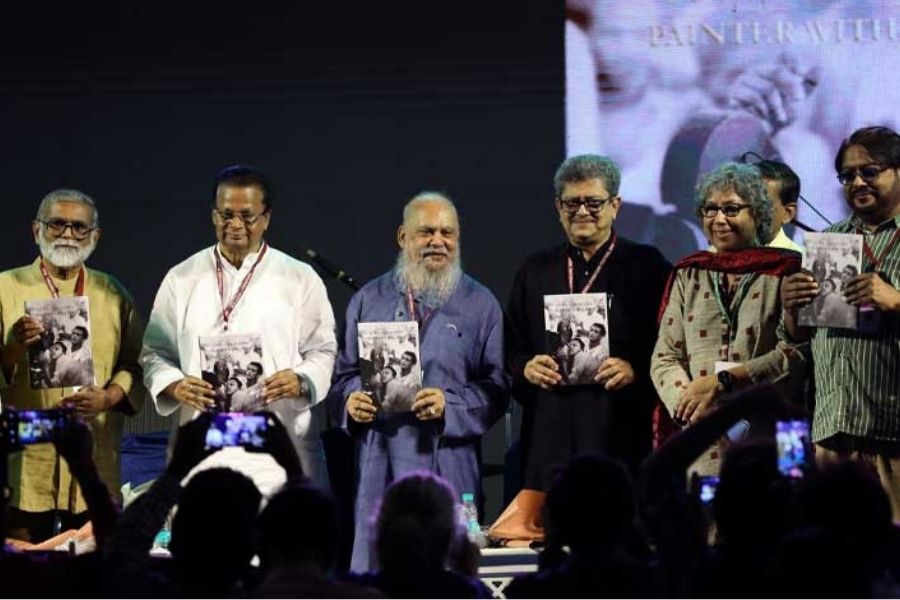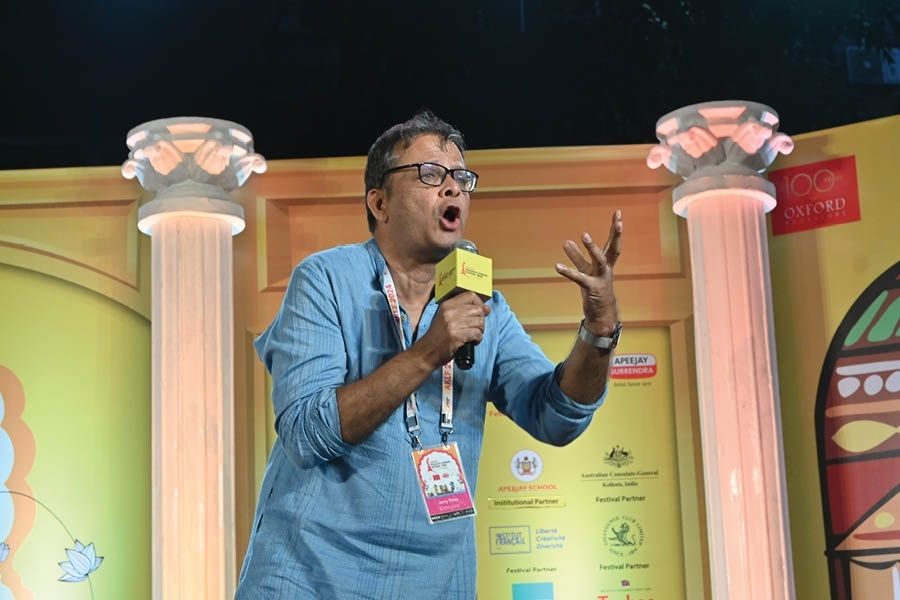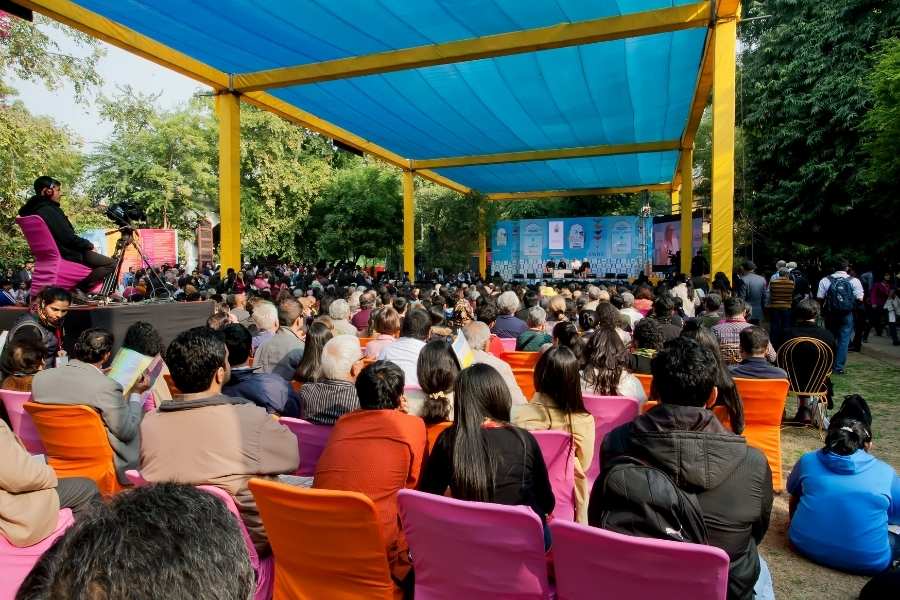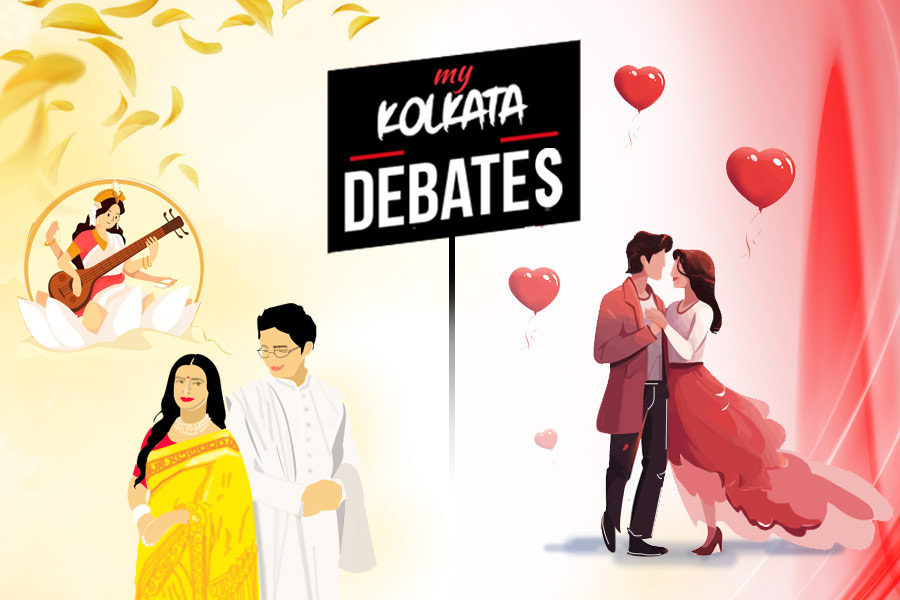When January comes, can lit fests be far behind? For more than a decade, the lit fest has been an integral part of Kolkata’s winter calendar. Having transitioned to online formats during the Covid-19 pandemic, the lit fest is very much back to being an in-person experience in recent years. But is it actually engaging, even egalitarian? Has the lit fest descended into a talking shop of superficial chatter or does it still entice people to think? In other words, do lit fests really matter?
Two My Kolkata writers, who have attended their share of lit fests over the years, argue their case in the latest edition of MK Debates, which celebrates Kolkatans’ fundamental right to have an opinion.
Lit fests prioritise performance over engagement, exclusivity over inclusivity, and personalities over stories

Lit fests can end up as a gladiatorial arena for psuedo-intellectualism TT archives
It’s a tale as old as time. You sit at your grandparents’ feet as they slurp from a generational heirloom of a steel glass, a musty old shawl wrapped tight around them — adequately prepared for the universally agreed-upon freezing-point of 18 degrees that signposts peak Kolkata winter. And invariably, the oft-visited memory lane, which the entire family and the neighbour’s dog know by rote, is charted, with sweet reminiscence about lit fests and the boi mela that go together like peas in a pod.
I have tried my utmost to fall in love with lit fests. I have attended countless talks and panel discussions in the hope of finding my eureka, awaiting moments of connection with voices that reverberate, searching for inspiration in the faces of the audience members contorted with intellectual strain. Every time, I have failed.
Lit fests take away from the essence of what literature actually is. They project an impermeable literary world where every big name comes with a set of personal history that you, as a member of the audience, must know in order to follow along satisfactorily. The moderated discussions, held under the umbrella of a giant festival, take on the atmosphere of exclusive inclusivity — in the tightly knit circles of authors and industry gurus, the average reader is lost. The lit fests of today often put panellists at the centre and relegate books to the margins as corollaries or byproducts (buy-products, if the publishers have their way!).
Lit fests also tend to reduce literature to a sideshow to accommodate authorial personalities. It’s no longer about the stories they tell but how eloquently they can drop buzzwords or humblebrag about “meeting Rushdie at a private soiree”. What you end up with is a gladiatorial arena for pseudo-intellectualism. The audience nods along to vague, abstract concepts while furiously Googling “postmodern intertextuality”. If literature is about genuine connection, lit fests are about who can say “epistemological” the fastest while sounding the most pretentious. The actual work — the text — takes a backseat. Literature, which thrives on quiet, personal engagement, is traded for the noise of a public performance.
The very setup of a modern lit fest is problematic. The conch shell of power moves horizontally on the literal pedestal of authors, while the audience is reduced to being simply that — passive listeners, a sounding board for a singular authorial word. Literature, a medium that invites intimate dialogue between the author and the reader, is transformed into a one-way conversation. Roland Barthes, with his ‘Death of the Author’ glare, would have popped a vein watching these cults of personality overshadow the text itself. Even the Q&A sessions, which promise interaction, frequently devolve into soapboxes for audience members, who spend five minutes framing what is essentially a comment as a question.
In the end, lit fests create an odd paradox: we gather to celebrate books but often leave feeling more disconnected from the act of reading itself. Lit fests prioritise performance over engagement, exclusivity over inclusivity, and personalities over the very stories that bring us all together. Isn’t it time we demanded better — for books and for readers?
— Aashera Sethi
Even in the age of curated events, the lit fest retains spontaneity, unpredictability and depth

For all its shortcomings, lit fests are still capable of exciting readers TT archives
The point of literature is to understand the world, not to change it. Increasingly, though, lit fests are expected to do both. An army of expectant stakeholders — publishers, literary agents, sponsors, bookstores, venues and more — are gradually eroding the essence of a lit fest, designed to be a forum for conversations between writers and readers. Nowadays every lit fest, old and new, is supposed to manufacture breakthrough insights, breakthrough deals and breakthrough stars. Or at least go viral on social media. In many ways, the lit fest has fallen prey to the hypercapitalist drive to convert every aspect of culture into ‘content’. But that doesn’t mean that lit fests have stopped being relevant, or fun!
A decade ago, when I was still in school, I remember ambling into my first lit fest in Kolkata, starry-eyed at a decked up Victoria Memorial. I was awestruck listening to Shashi Tharoor, even though I could not elbow my way through a crowd of admirers to get my copy of The Great Indian Novel signed. Last year, I was at Allen Park in Park Street, marvelling at the emperor of energy, Jerry Pinto, who had managed to make scores of adults stand for more than 15 minutes on a Sunday evening and chant prayers (which he had translated himself). Even in the age of curated events, the lit fest, at least in Kolkata, retains an element of spontaneity and unpredictability. Most importantly, it retains depth.
Where else will you find day-long conversations that delve into multiple aspects of an author’s works, techniques and vision? Where else will some of the country’s (and the world’s) finest minds be within touching distance of each other, arguing, reflecting and joking? Where else can you walk in at any given time (without a ticket or a subscription) and indulge yourself in a smorgasbord of ideas? The fact that some lit fests drop the ball by platforming mediocre authors (or influencers) or inarticulate moderators is not an argument against the relevance of lit fests.
However, it is true that the lit fest is no longer as democratic as it used to be. I may not be able to go up to Shashi Tharoor and strike a two-minute conversation the next time he eviscerates the British Empire at the Victoria Memorial. I may not even get to see where he goes once he is done talking on stage. Access at lit fests depends on agendas, and the agenda of the lay reader ranks at the bottom. It is just as legitimate to have a gripe against lit fests for overdoing the pomp and ceremony (how much longer until the closing act of a lit fest features an EDM concert as a warped tribute to Nietzchian nihilism?!). But, at its core, the lit fest still does a good job of furthering the culture of reading, of introducing new books, voices and concepts (especially when it comes to vernacular literature and translations) that would rarely earn the approval of algorithms.
Ultimately, the lit fest matters because it still makes readers like me excited to get out of bed, take a metro, put my phone in my pocket, and listen to writers in ways I cannot on YouTube or Spotify. The fact that I can still get my friends to come along and share the experience means that the lit fest remains a festival — a window into words and the worlds they weave.
— Priyam Marik

